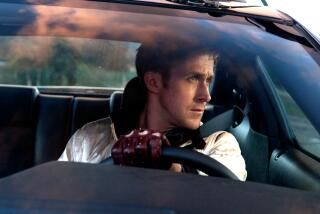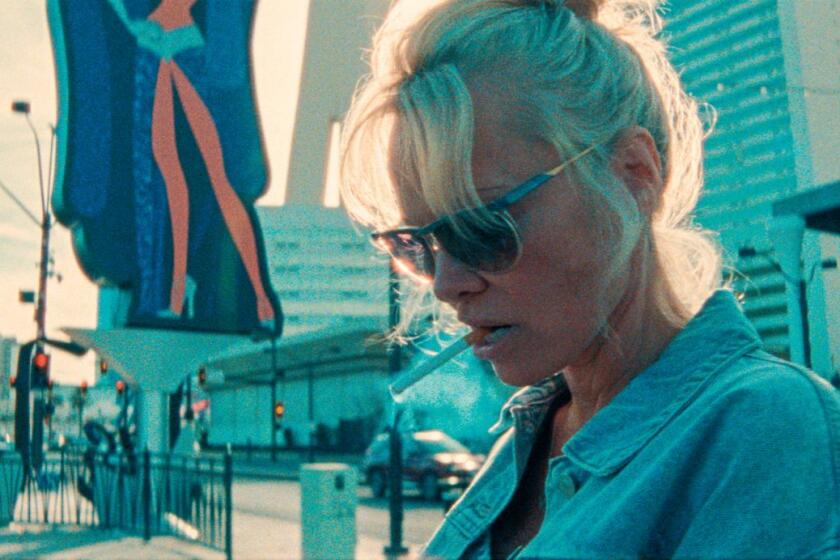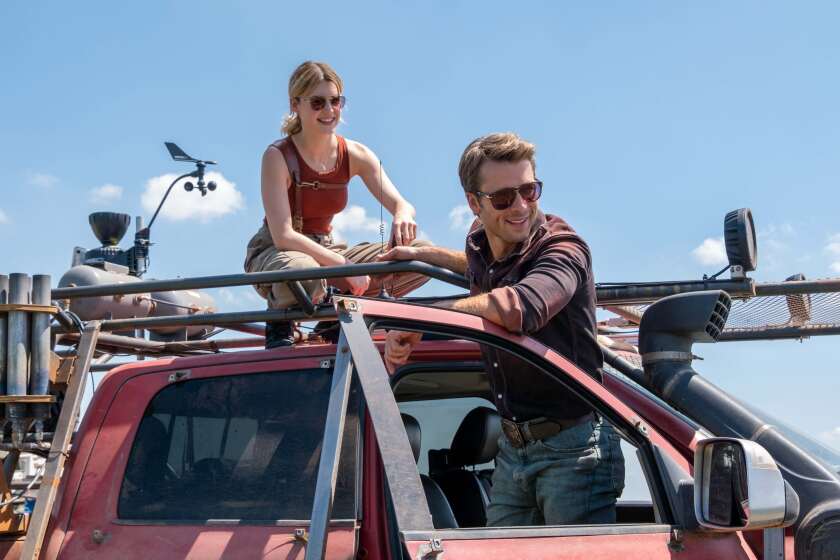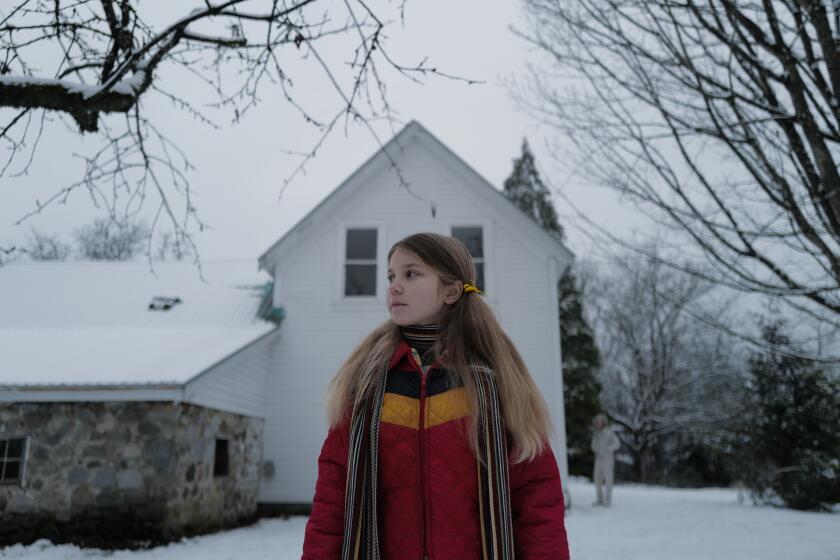Why Is This Man Smiling? : Movies: After navigating his way around scripts and moguls, David Koepp is on the A-list with ‘Paper,’ ‘Carlito’s’ and ‘Jurassic.’
David Koepp, co-author of Ron Howard’s “The Paper,” is an industry anomaly: a happy screenwriter. In a town that routinely relegates scripts to development hell, seven of those he has written or co-written have surfaced on the big screen in the past six years.
“I’m incredibly spoiled,” admits the Wisconsinite, whose squeaky-clean look and self-deprecating air set him apart from many Hollywood hustlers.
“The real challenge will be the next five years when none of my scripts get made. Though I work hard, I’ve been lucky. My movies have been done by filmmakers with a lot of clout--guys who could say, ‘I’ve got a piece of origami I’d like to turn into a film’ and the project would get a ‘go.’ ”
“The Paper,” a newspaper comedy/drama starring Michael Keaton and Glenn Close, which opened in Los Angeles last Friday, follows on the heels of “Carlito’s Way,” which Koepp adapted for Brian De Palma. Before that, Koepp had a shared credit on Steven Spielberg’s “Jurassic Park”--which surpassed “E.T.” to become the highest-grossing film of all time.
And, with Universal preparing for a July release of “The Shadow,” his big-screen portrayal of the mysterious vigilante, the 30-year-old Koepp is perched at the top of Hollywood’s A-list.
“If he’s not the hottest screenwriter in town, David is certainly up there,” says Tom Pollock, chairman of the MCA Motion Picture Group for whom Koepp also co-wrote “Death Becomes Her.”
“Though he’s no Ben Hecht or Herman Mankiewicz, he is smart and untemperamental. David has earned the respect of some top directors who are opinionated to a greater or lesser degree because he consistently delivers the goods.”
Koepp’s success comes as little surprise to his brother, Stephen, 37, a Time magazine editor with whom he wrote “The Paper.” As a child, he says, things came readily to David, whose easy way with people masks a fierce competitiveness.
“I’d always have to find my way through a maze--doing research, coming up with alternatives--while David would leap right over it,” Stephen says. “He doesn’t bother with the extraneous. What’s also unusual is that both sides of his brain work. David not only comes up with incredible turns of phrase and dialogue but also has a great mind for structure.”
Koepp grew up in Pewaukee, Wis. (pop. 3,000), the youngest of four children. Dad has a billboard company. Mom is a nurse-turned-family therapist. Grandpa was mayor of the town. After a year at college in Minnesota, Koepp transferred to the University of Wisconsin with the intent of becoming an actor. On the advice of a professor impressed with his screenwriting skills, he enrolled in UCLA Film School in 1984.
Koepp’s first cinematic outing was “Apartment Zero,” an Argentinian drama co-written with his brother-in-law, Martin Donovan. Universal Pictures expressed interest in his follow-up effort, the 1990 yuppie thriller “Bad Influence”--provided he rewrite it as a comedy. Koepp bucked the suggestion and turned to Trans World Entertainment instead.
“I was broke, so walking away from the one studio that wanted the movie wasn’t easy,” he recalls.
Impressed with his resolve, Universal signed Koepp to an exclusive multiyear deal that expired last July--and he’s been working overtime ever since. The 1992 black comedy “Death Becomes Her,” starring Meryl Streep and Goldie Hawn, transformed him, in the eyes of Hollywood, from a writer of quirky thrillers into, as he puts it, “a big movie guy.”
Last fall’s “Carlito’s Way” brought him together with producer Martin Bregman (“Dog Day Afternoon”), who became a friend and mentor. And his adaptation of Michael Crichton’s “Jurassic Park” without question changed his life.
“I feel more comfortable insisting on things than I did before and, though I haven’t cut any deals since ‘Jurassic’ came out, I assume my quote will go up,” says Koepp, who was reportedly in the $1-million-a-script league even before that movie’s success.
Koepp’s mandate on “Jurassic” was to flesh out the book’s characters--a challenge he’s not sure he met. “There are some nice moments, but I wish I’d done better,” he says. “Providing a filmic structure was a major challenge. But it was the genius of Crichton’s idea--his ability to make it all believable--that carries the story.”
*
According to sources, that didn’t stop Koepp from filing for sole screenwriting credit--against the advice of Spielberg and Universal. Though dislodging Crichton, who’d written the initial drafts, was a no-win proposition, he took the matter to arbitration, which awarded a shared credit.
Koepp is known as a full-service writer, willing to go back to the drawing board again and again. On “Carlito,” he turned in 15 drafts.
“I don’t expect a director to be slavishly faithful to my vision,” Koepp says. “Screenwriting is not like writing a novel. If an idea really turns a director’s crank, you’d be well-advised to follow it.”
After a string of adaptations, “The Paper” gave Koepp a chance to tackle a theme of his own: the difficulty of finding a balance between life and work. It’s an issue that concerns him more these days, since Rosario Varela--his wife and creative sounding board--just gave birth to their first child.
“This is not a newspaper movie like ‘Front Page,’ but a workplace drama about the toll jobs take,” he says. “I feel like I’ve been under water for two years. Still, this is a very ‘uptown’ problem. It would be awfully ugly to complain.”
Koepp has not taken on any outside work for the past six months, preferring to concentrate on a spec script titled “The Trigger Effect.” One precondition of the sale is the opportunity to direct.
“If you ride in a car your whole life, you get curious about driving,” he explains. “And working with all those pros . . . you couldn’t ask for a better film school.”
Koepp admits that he’s more “Hollywood” these days--that “in spite of yourself, you pick stuff up.” Like a car phone, for instance, which he’d resisted for years. Quite a contrast to the days he drove a battered Toyota. Or to his first 18 months in this town when he actually relied on the bus.
“Doing something as singular and amazing as ‘Jurassic’ puts you under a harsh spotlight,” observes brother Stephen. “I’m seeing two Davids: One is still open, almost innocent, with family and friends. The other, who takes lunch with moguls, is justifiably more wary since he’s dealing with people who are cunning and shrewd.
“David has proven to be very adaptable,” his brother concludes. “Though I used to tease him mercilessly, I can’t afford to anymore.”
More to Read
Only good movies
Get the Indie Focus newsletter, Mark Olsen's weekly guide to the world of cinema.
You may occasionally receive promotional content from the Los Angeles Times.






